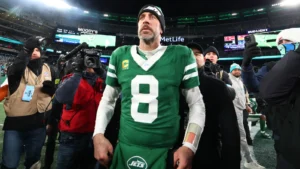In an unexpected development, the New York Jets have taken the audacious step of releasing their star quarterback, Aaron Rodgers, during the 2025 offseason. This announcement has left fans in disbelief, questioning the circumstances that led to such a significant decision.
Although the move appears abrupt, it follows a series of internal discussions and reports. Particularly noteworthy is the ultimatum issued by the Jets to Rodgers, which ultimately precipitated this separation and has garnered considerable attention.
This article will examine the sequence of events that unfolded, the leadership dynamics under new head coach Aaron Glenn, and the implications for both the Jets and Rodgers moving forward.
A Shift in Leadership Under Aaron Glenn
The appointment of Aaron Glenn as the new head coach of the New York Jets has undoubtedly initiated a transformation in the franchise’s operational dynamics. Glenn’s innovative perspective on leadership is characterized by a strong emphasis on discipline and accountability, which was particularly evident in his interactions with veteran quarterback Aaron Rodgers.
Analysis of the Jets indicates that Glenn’s methodology significantly diverges from that of his predecessors, especially in addressing Rodgers’ distinctive situation.
Historically, Rodgers was recognized for his autonomy, frequently appearing on the Pat McAfee show and occasionally opting out of mandatory team activities, such as minicamp, to pursue personal engagements. This level of flexibility was tolerated by the previous coaching staff.
However, under Glenn’s guidance, the narrative has shifted considerably. He has unequivocally communicated that such conduct will no longer be accepted. This alteration in expectations transcends mere disciplines; it aims to foster a new culture within the locker room, one in which all players, regardless of their stature, are required to adhere to the team’s established rules and principles.
The Ultimatum: A Critical Turning Point
A critical juncture was reached when the Jets presented an ultimatum to Rodgers. According to Dianna Russini of The Athletic, the Jets explicitly stated that for Rodgers to remain with the team, he would need to comply with new expectations. A significant condition was that Rodgers would no longer be allowed to appear on the Pat McAfee show.
This was not merely a minor limitation; it was aimed at managing the narrative surrounding the team and ensuring that players remained focused on their duties and responsibilities.
For Rodgers, who had become accustomed to a certain degree of autonomy and public visibility, this was a challenging adjustment. As a four-time NFL MVP and a likely Hall of Famer, he was used to operating on his own terms. Nevertheless, the Jets’ ultimatum forced him to decide between adapting to the team’s evolving culture or seeking opportunities elsewhere.
The situation became increasingly obvious: Rodgers would either need to embrace the Jets’ new approach under Glenn, or the two parties would have to part ways. The Jets were establishing a standard that no player, regardless of their achievements, would be exempt from the team’s regulations.

Aaron Rodgers’ Past Behavior: A History of Independence
Rodgers’ interactions with the media and his distinctive approach to team obligations were widely recognized. Throughout his career, he cultivated a reputation for expressing his thoughts candidly, frequently offering public critiques of both the team and its management.
This was particularly evident in his frequent appearances on the Pat McAfee show, where he shared frank opinions and reflections on his personal and professional journey. Although these interviews garnered significant fan interest and contributed to shaping Rodgers’ public image, some viewed them as potential distractions from the team’s objectives.
His choice to forgo mandatory minicamps, including a trip to Egypt, also drew scrutiny from within the organization. While the previous coaching staff and management were somewhat accommodating, albeit critical, of his absence, the new leadership under Glenn adopted a less lenient stance.
Analysis from the Jets indicates that Glenn and the new management team, headed by GM Darren Mougey, aimed to establish a culture of discipline that would not be influenced by any player’s prior achievements.
The Financial Impact: Dead Cap Concerns and the Future of the Jets
The transition in leadership and shifts in organizational culture were pivotal factors; however, a crucial element influencing the Jets’ choice to part ways with Rodgers was financial implications. Reports from Schultz on X indicate that the team was grappling with considerable dead cap money issues related to Rodgers’ contract. This predicament made it financially burdensome for the team to keep him, even if the leadership challenges could be overcome.
The Jets faced a challenging dilemma: to either continue disbursing a substantial portion of Rodgers’ salary while navigating locker room dynamics or to sever ties and embark on a new beginning. Ultimately, the decision to release Rodgers appeared to stem from a blend of cultural and financial considerations.
Analysis from the Jets suggests that the new leadership team, led by Mougey and Glenn, was prepared to absorb the financial repercussions in order to pave the way for a new era in Jets football.
The Importance of Culture and the Future of the Jets
A significant lesson derived from this scenario is the necessity of cultivating a robust and unified culture within an NFL team. For a team to achieve success, it is essential that there is harmony among the players, coaching staff, and front office.
Under the guidance of Aaron Glenn, the Jets are demonstrating that no player, regardless of their experience or status, is exempt from adhering to the team’s core principles. Although this strategy may provoke some controversy in the short term, it has the potential to establish a solid foundation for enduring success.
The Jets’ subsequent objective is to identify a new quarterback who aligns with the culture that Glenn aims to foster. This task will prove challenging, as finding a replacement for a player of Rodgers’ caliber is no trivial matter. Nevertheless, the team is now in a position to recruit an individual who will not only excel on the field but also embrace the team-first philosophy that Glenn is working to promote.
Analysis of the Jets indicates that this decision, while fraught with risk, could be precisely what the organization requires to initiate a new chapter and construct a team that is well-equipped for long-term achievement.

Expert Editorial Comment
The choice to part ways with Aaron Rodgers marks a pivotal chapter in the New York Jets’ history. Although Rodgers’ abilities are beyond question, the leadership under Aaron Glenn has emphasized the importance of culture and accountability as paramount.
By presenting an ultimatum to Rodgers, the Jets have taken a courageous step towards redefining the standards of their organization. The outcome of this decision remains uncertain; however, it is evident that the Jets are dedicated to fostering a winning culture, even if it necessitates the departure of a potential Hall of Famer.
The future trajectory of the Jets now rests with Glenn, Mougey, and the next quarterback who will emerge. Should they adeptly manage this transition, the team could potentially cultivate something remarkable in the coming years.
Only time will reveal whether the Jets’ audacious choice to move on from Rodgers will yield positive results, but it is clear that the organization is intent on establishing a solid foundation that emphasizes teamwork, discipline, and accountability as its core values.
